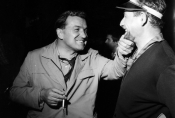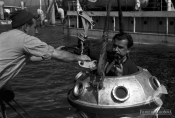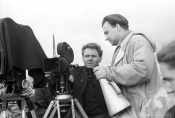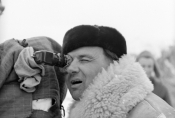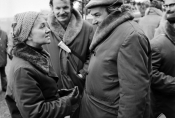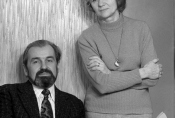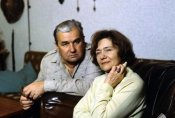Czesław Petelski
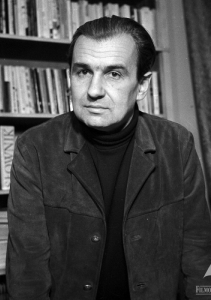
Film director, screenwriter. He was born on November 5, 1922, in Białystok, died on September 19, 1996, in Warsaw. At first, he studied at the State Institute of Theatrical Arts in Warsaw, then moved to the Department of Directing at the State Film School in Łódź, where he graduated in 1955. It was there that he met Ewa, his future wife, also a graduate of the Department of Directing, with whom he made the vast majority of his films (in addition to the novellas in Trzy opowieści/Three stories and Trzy starty/Three Take-offs made – respectively – in 1953 and 1955; he made only two features on his own, Baza ludzi umarłych/The Depot of the Dead, 1958 and Gorzka miłość/Bitter Love, 1989).
Wraki/Wrecks (1956), their full-length debut, is an adaptation of the psychological novel by Janusz Meissner; Petelski received wide acclaim for his Baza ludzi umarłych/The Depot of the Dead (1958), made in the style of a film noir, inspired by the short stories of Marek Hłasko. A timber transport base in Bieszczady. A group of men – outcasts and rejects – toil at timber transport. Their work is extremely difficult and dangerous. Everyone wants to get out at any price. Zabawa, a mechanic, a powerful and ruthless man, is sent there to monitor the situation... Changes made by the director in the script caused the writer to withdraw his name from the film credits. Petelski’s next film, Kamienne niebo/The Stone Sky (1959), was based on a book by Jerzy Krzysztoń; it is a drama dedicated to several people stuck in one of Warsaw's houses during the Warsaw Uprising. The Petelskis returned to war themes in their Naganiacz/Huckster (1963, awards at Locarno), inspired by Roman Bratny’s prose. Ogniomistrz Kaleń/Sergeant Kaleń (1961), based on the book Łuny w Bieszczadach/Fires in Bieszczady by Jan Gerhard. Particularly noteworthy are two of their films set before the war: Czarne skrzydła/Black Wings (1962, Silver Medal in Moscow), based on the popular novel by Juliusz Kaden-Bandrowski and Drewniany różaniec/Wooden Rosary (1964), an adaptation of Natalia Rolleczek’s shocking book, exposing the situation in an orphanage run by nuns. The Petelskis gained great popularity for their visually stunning historical productions: Jarzębina czerwona/Red Rowan (1969), dedicated to the battle of Kołobrzeg in 1945, Kopernik/Copernicus (1972, awards in Moscow, Avellino and Łagów), and Kazimierz Wielki/Casimir the Great (1975). A little more intimate was their Urodziny młodego warszawiaka/A Young Warsaw Boy’s Birthday (1980), based on the novel by Jerzy Stefan Stawiński, or the monumental melodrama Kamienne tablice/Stone Tablets (1983). Among the particularly noteworthy contemporary films directed by the couple is Bilet powrotny/The Return Ticket (1978, award in Gdańsk), an insightful psychological study of a woman from the countryside who travels to Canada for work, so that her son can build a house in the city.
In the years 1963-1980 and 1982-1987, Czesław Petelski served as the artistic director of the “Iluzjon” Film Studio.
Jerzy Armata
Selected filmography
Articles
-
That Which is Absent
Karolina Kosińska
„Kwartalnik Filmowy” – Special Issue 2013: “Polish Film Scholars on Polish Cinema”
